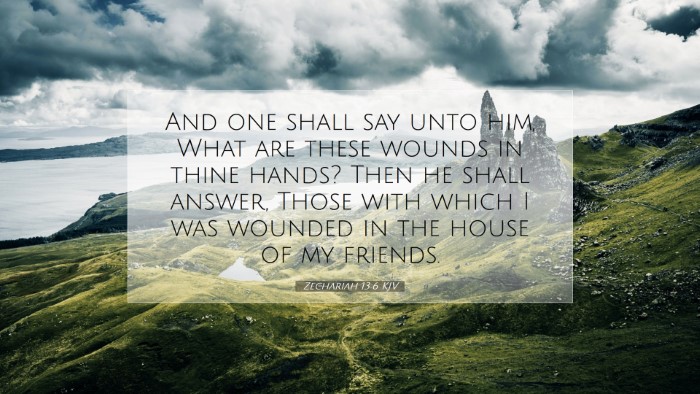Old Testament
Genesis Exodus Leviticus Numbers Deuteronomy Joshua Judges Ruth 1 Samuel 2 Samuel 1 Kings 2 Kings 1 Chronicles 2 Chronicles Ezra Nehemiah Esther Job Psalms Proverbs Ecclesiastes Song of Solomon Isaiah Jeremiah Lamentations Ezekiel Daniel Hosea Joel Amos Obadiah Jonah Micah Nahum Habakkuk Zephaniah Haggai Zechariah MalachiZechariah 13:6
Zechariah 13:6 KJV
And one shall say unto him, What are these wounds in thine hands? Then he shall answer, Those with which I was wounded in the house of my friends.
Zechariah 13:6 Bible Commentary
Commentary on Zechariah 13:6
Zechariah 13:6 reads: "And one shall say unto him, What are these wounds in thine hands? Then he shall answer, Those with which I was wounded in the house of my friends." This verse is rich in meaning and prophetic symbolism, conveying deep theological insights and foreshadowing. Below, we provide a synthesis of insights from notable public domain commentaries.
Context and Background
The prophetic book of Zechariah, situated towards the end of the Old Testament, emerges from the post-exilic period. The prophet addresses the spiritual restoration of Israel and highlights themes of repentance and the coming Messiah. This verse is particularly poignant in its messianic implications, reflecting on the suffering and wounds of the future Redeemer, and it serves as a bridge between the Old and New Testaments.
The Questions Raised
This verse opens with a question directed towards a wounded figure: "What are these wounds in thine hands?" The inquiry carries a tone of curiosity and sorrow, likely addressed to a messianic figure who bears visible signs of suffering.
- Interpretation of the Question: Matthew Henry suggests that the question may indicate a recognition of wounds that are both physical and symbolic, representing the trials that come from companionship and betrayal.
- Significance of the Inquiry: Albert Barnes posits that the question reveals a universal human inquiry into the nature of suffering, particularly why those close to one another might betray or injure one another.
Wounds in the Hands
The answer given is profound: "Those with which I was wounded in the house of my friends." This response has significant implications:
- The Nature of the Wounds: Adam Clarke notes that the hands symbolize the work of the Redeemer, and the wounds signify suffering endured specifically from those deemed friends, reflecting betrayal and deep emotional pain.
- Implications of Friendship and Betrayal: The phrase "the house of my friends" indicates that suffering can arise from close relationships, amplifying the pain. This mirrors the betrayal of Christ by Judas Iscariot, aligning this prophecy with the New Testament accounts.
Theological Insights
The theological ramifications of Zechariah 13:6 extend into various dimensions of Christian doctrine:
- Messianic Prophecy: This verse is foundational in its prophetic portrayal of the Messiah as a figure who suffers for His people. Matthew Henry highlights that Jesus embodies this prophecy, bearing the wounds from the sins of humanity.
- Redemptive Suffering: The suffering depicted in this verse precedes a significant redemptive act. Albert Barnes emphasizes that the wounds signify the great sacrifice that would lead to the salvation of many.
Pastoral Reflections
For pastors, this verse serves as a reminder of the nature of Christ's sacrifice and the reality of human relationships:
- Ministry of Healing: The wounds are indicative of compassion and understanding in ministry. In recognizing the wounds of Christ, pastors are encouraged to promote healing within their congregations.
- Understanding Betrayal: The passage underscores the reality of betrayal, encouraging pastors to foster community with authenticity and grace, knowing that even among believers, pain can come from close relationships.
Application for Students and Theologians
Students and theologians can glean these lessons from Zechariah 13:6:
- Critical Analysis of Prophecy: An examination of the interplay between Old Testament prophecy and New Testament fulfillment encourages rigorous theological debate and helps illuminate the continuity of Scripture.
- The Nature of Christ: This verse invites further exploration into the nature of Christ's humanity and divinity, particularly how His experience of suffering makes Him relatable to our human condition.
Conclusion
In conclusion, Zechariah 13:6 encapsulates essential truths about suffering, betrayal, and redemption woven throughout Scripture. The wounds in the hands of the messianic figure underscore the depth of Christ's sacrifice and offer profound comfort to believers. Both the historical context and the prophetic implications of this verse enrich our theological understanding and enhance our appreciation of the intricate narrative of salvation history.


